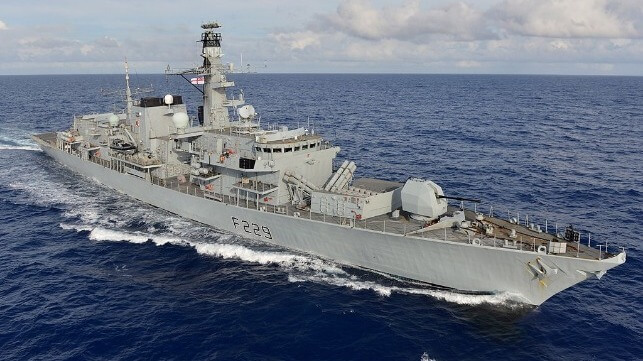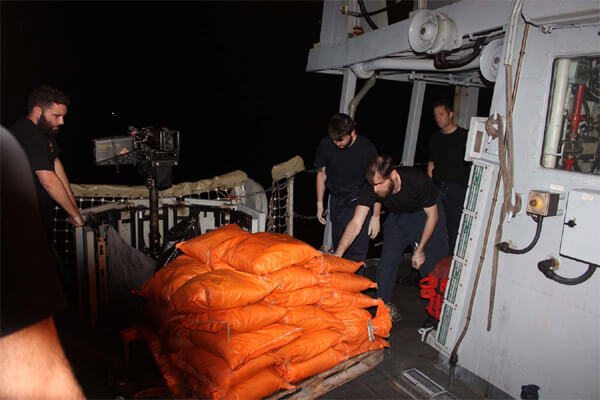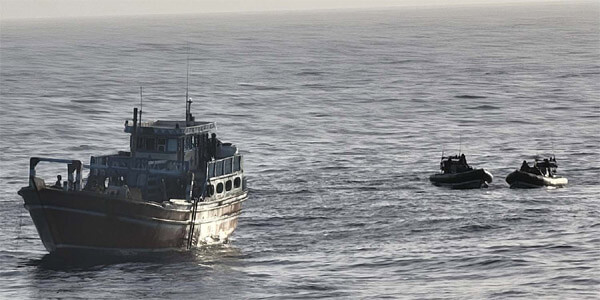Royal Navy Conducts Drug Seizures and Assists with Iranian Incident

After reports to Parliament last week that the UK planned on increasing its activities in and around the Persian Gulf, the Royal Navy highlighted a busy series of events for its frigate HMS Lancaster. The vessel has been in the region since late 2022 and except for a recent relief mission to Sudan, is working with the United States and Allied commands for patrols of the Indian Ocean and the surrounding areas.
The Lancaster, a Type 23 frigate, departed the UK in August 2022 as part of a three-year mission to the Middle East. The vessel first conducted exercises with NATO before arriving in December 2022 taking over from her sister ship HMS Montrose. At the time, the Royal Navy reported that HMS Lancaster’s mission is to clamp down on illicit activities, notably drug smuggling, and in her first month had already worked with two task forces in the Middle East to ensure lawful seafarers enjoy safe passage.
The Royal Navy is now highlighting two callouts that resulted in the seizure of a total of seven tons of hashish, heroin, and methamphetamine across the operations in the Indian Ocean while on a security patrol. They are estimating the total street value of the seizures at £10 million (approximately $12.5 million).

“I am immensely proud of my entire team for their efforts in successfully executing two boardings, in challenging conditions, and inside of 12 hours,” said Commander Tom Johnson, the ship’s Commanding Officer. “This comes less than a day after concluding an intense period of maritime security operations in the Straits of Hormuz.”
In the first call as part of a dawn mission, the ship’s specialist Royal Marines boarding team found 3.5 tons of narcotics after tracking down a suspect vessel since the early hours of the morning. During the boarding operation, the Royal Navy reports there were indications that the vessel had started its journey from the Iranian coast, before embarking the drugs at sea from another vessel.
That same evening, the ship’s Wildcat helicopter spotted another craft and the boarding team seized a further 3.7 tons of drugs. The Wildcat was patrolling the surrounding seas acting as the ship’s eyes when they called in suspicious activity. The frigate’s boarding team, having only just reset from the previous boarding, sprang into action to do it all again.
Searching this second craft they uncovered a large quantity of packages that were confirmed to be hashish. A total of 376 bags were recovered with a UK wholesale value of just over £4m.

These actions came after the HMS Lancaster along with the U.S. Navy received the distress call on June 3 from a merchant ship transiting the Strait of Hormuz. Lancaster’s crew launched their Wildcat helicopter to assess the situation and provide a real-time feed to the ship’s Commanding Officer. They were also working closely with aircraft from the U.S. Navy to provide overwatch for the merchant vessel.

that matters most
Get the latest maritime news delivered to your inbox daily.
The navies reported that after they began this surveillance, the small vessels harassing the merchant ship dispersed. The U.S. Navy said that it believed they were Iranian fast-attack boats from the Iranian Revolutionary Guard Corps Navy. The Royal Navy is confirming the earlier U.S. Navy reports that the boats withdrew and that the merchant ship was able to continue on its way.
HMS Lancaster is part of the United Kingdom’s enduring presence in the Middle East. The Royal Navy is working with allies to support maritime security and counter illegal activity in the region.
